'Caffè e acqua frizzante, per favore.’ Ilja Leonard Pfeijffer bestelt een koffie en water bij de serveerster van bar 28 Erbe. Het is eind van de ochtend en het terras op het Piazza dell’ Erbe, op een steenworp afstand van het palazzo waar de schrijver woont, begint het langzaam wat drukker te worden.
Pfeijffer woont inmiddels alweer tien jaar in Genua, de stad die hij met zijn bekroonde roman La Superba – onlangs ook verschenen in Italië – op magistrale wijze de liefde verklaarde. Elk jaar ziet hij het er een beetje drukker worden. ‘Maar het heeft gelukkig nog totaal niet de proporties van het toerisme in Venetië of Florence,’ vertelt hij terwijl hij een sigaret rolt. ‘Deze stad kan het hebben, het centrum is groot genoeg. De meeste toeristen blijven een beetje in de Via Garibaldi en bij de kathedraal San Lorenzo hangen. Ze durven die enge, smalle, vieze steegjes niet in. Zo beschermt de stad als het ware zichzelf.’
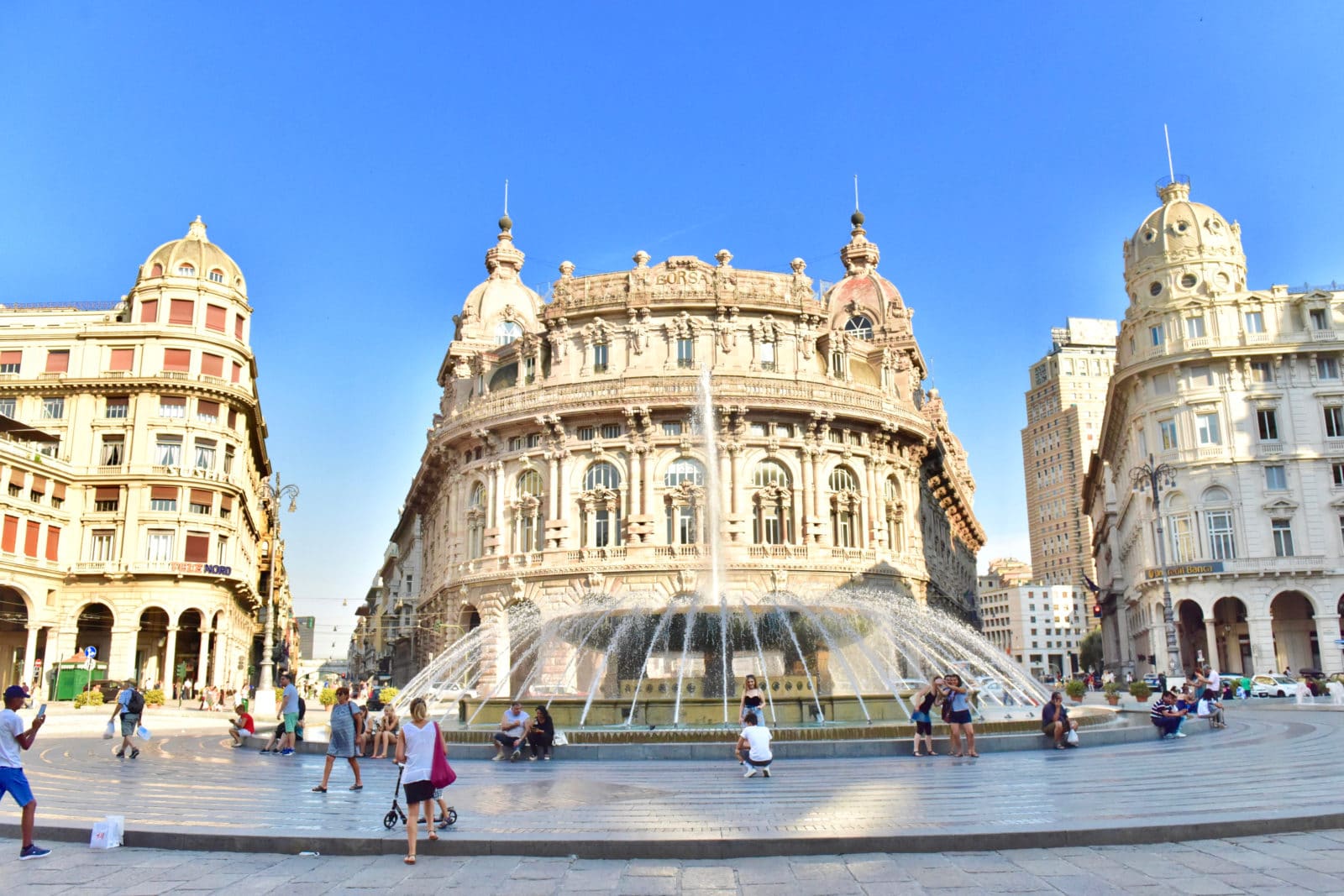
Massatoerisme
Massatoerisme is een van de thema’s in zijn nieuwe, grote roman Grand Hotel Europa. Een schrijver (luisterend naar dezelfde naam als zijn schepper) blikt in een oud hotel terug op de gestrande relatie met zijn vriendin Clio. De roman speelt zich af in Venetië. In hilarische scènes – bijvoorbeeld een waarin de schrijver een poging doet om voor haar een bos bloemen te kopen – neemt Pfeijffer het massatoerisme waaronder de stad bezwijkt, op de hak.
‘Venetië is het prototypische voorbeeld van hoe het mis kan gaan. Het is er altijd heel erg druk, tegelijk is de stad totaal ontvolkt. Uit volkstellingen van 1400 blijkt dat Venetië destijds 140.000 inwoners had. Op dit moment zijn het er minder dan 50.000. Dus het inwoneraantal is gedecimeerd ten opzichte van de Middeleeuwen! En elke dag loopt het verder terug. Ergens in Venetië heeft een apotheek in de etalage een teller hangen van het aantal inwoners van Venetië, en je ziet daar het aantal inwoners dagelijks teruglopen. Als het in dit tempo doorgaat, heeft Venetië in 2030 geen inwoners meer. Dan is het Disneyland geworden, een openluchtmuseum voor toeristen. Hek eromheen en klaar.’
Pfeijffer neemt een slok van zijn koffie. Massatoerisme is desastreus, vertelt hij hoofdschuddend, het vermoordt een stad. ‘Het afgelopen jaar ging ik een paar maal met mijn vriendin Stella naar Florence, omdat zij daar moest zijn voor haar werk. Het centrum van Florence is natuurlijk schitterend, maar eigenlijk is het ook al geen echte stad meer. In Venetië is dat dus nog veel erger; de hele binnenstad wordt verhuurd aan toeristen. Investeerders kopen de boel op. Alle faciliteiten in de stad zijn afgestemd op toerisme.’
‘Voor de paar inwoners die er nog zijn wordt het steeds lastiger om in hun dagelijkse levensbehoeften te voorzien. Een pak melk kopen lukt je niet meer. Zoek je daarentegen een plastic gondelbootje met knipperlichtjes of een authentiek Venetiaans carnavalsmasker, made in China, dan kun je overal terecht. Als je dan ziet dat de huizenprijzen enorm stijgen, dan is de beslissing natuurlijk gauw gemaakt om je huis maar te verkopen en elders te gaan wonen. Dat is precies wat er gebeurt.’
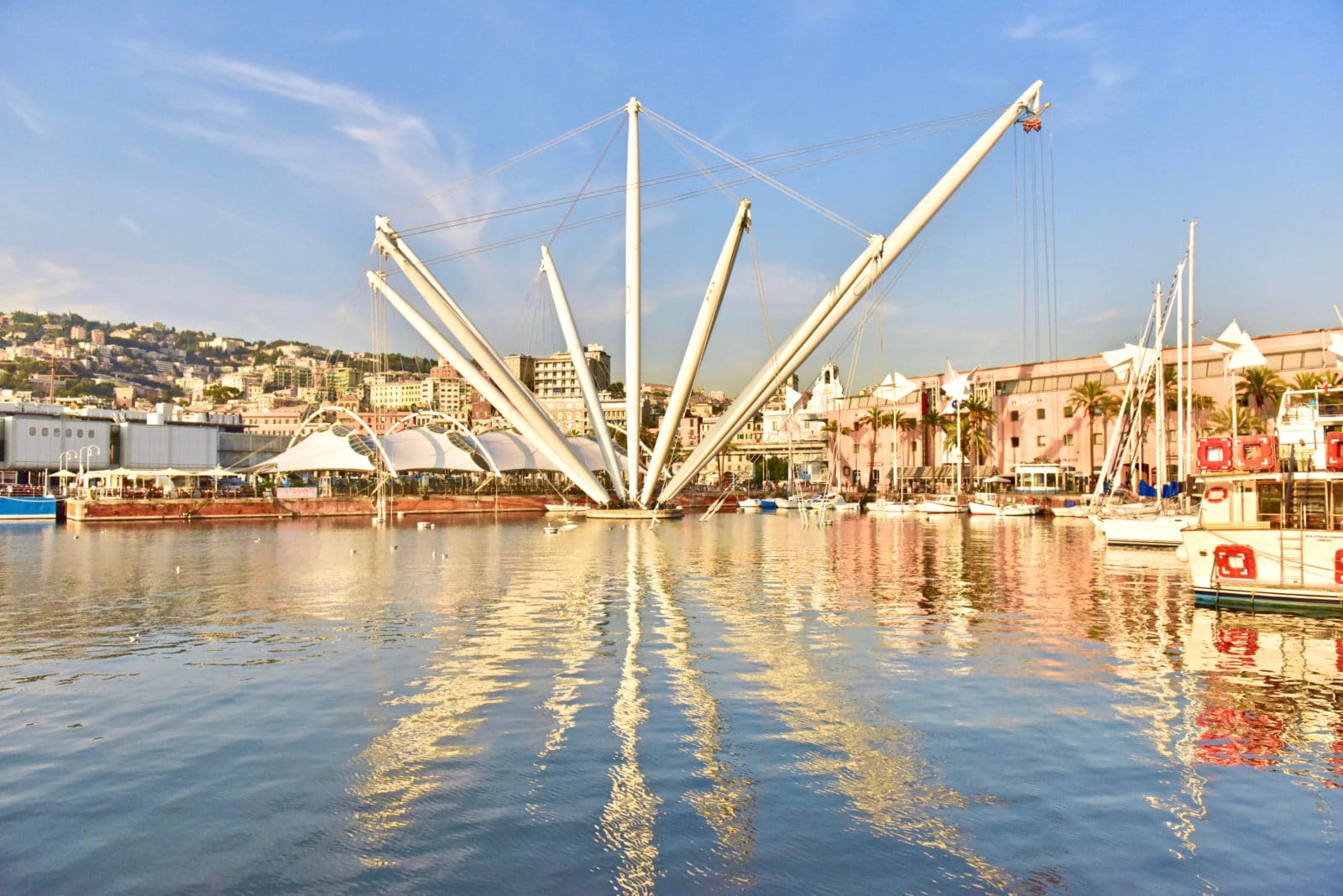
Verdienmodel
Voor Venetië is het te laat, denkt hij, maar wellicht zijn steden als Amsterdam nog net op tijd te redden. ‘Het centrum van Amsterdam gaat in hoog tempo Venetië achterna. Ik denk dat veel mensen het nu nog niet echt doorhebben, maar in de komende jaren zullen we gaan beseffen dat massatoerisme echt een bedreiging is en veel kapotmaakt. Nu wordt het nog gezien als verdienmodel, als goed voor de economie, maar dat is volgens mij een fictie. Het levert de stad zo’n 65 miljoen euro op, maar daar staan ook kosten tegenover: elke dag moeten er tien ambulances uitrijden voor toeristen, er is extra stadsreiniging nodig, et cetera. Als je al dat soort kosten bij elkaar optelt, kom je op een bedrag dat veel hoger is dan 65 miljoen.’
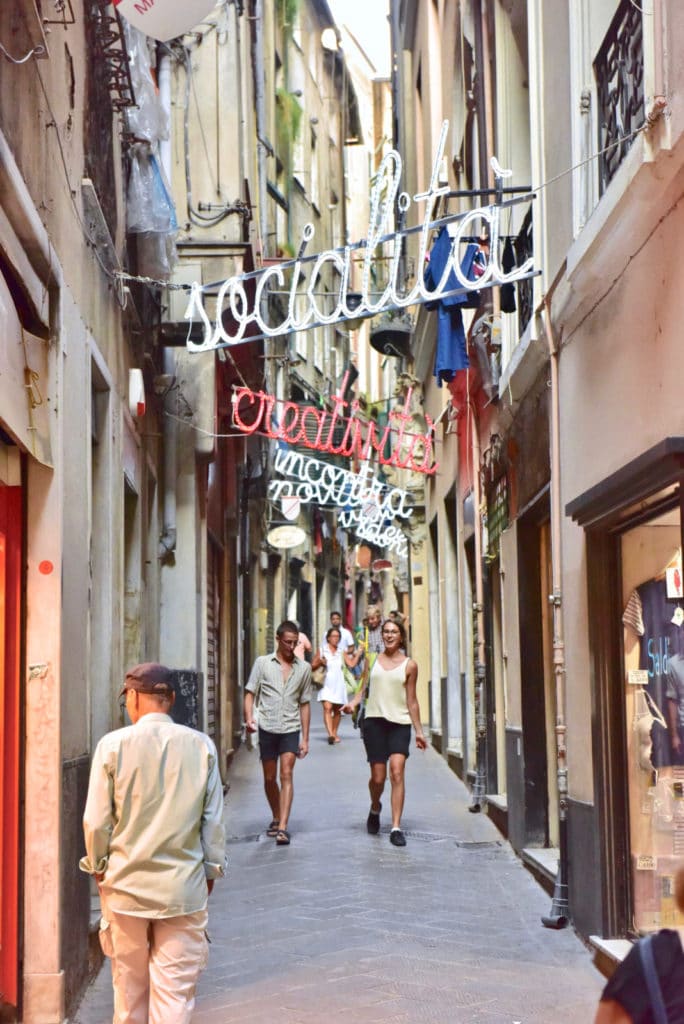
Stijlvolle dame
‘Ook in Genua groeit het toerisme,’ vervolgt Pfeijffer, ‘maar hier wónen nog echt mensen. Bovendien wordt hier nog aan andere zaken – prostitutie, drugshandel – geld verdiend, dus men zal het centrum denk ik niet zomaar uitleveren aan het toerisme. Hier heerst de mentaliteit van een zeevarend volk, van handelaars: die laten nooit het achterste van hun tong zien. Dat geldt ook voor de stad zelf. Als je als toerist in Genua komt, moet je je best doen om de stad te ontdekken. Te veroveren.’
‘Genua is als een stijlvolle, oude dame die veel geheimen heeft waarover ze nooit zal vertellen. Haar kleren zijn weliswaar een beetje vaal en versleten, maar ze rinkelt nog wel met al haar juwelen. Ze geeft zich niet onmiddellijk gewonnen, zoals Rome. Genua is spannender, authentieker en raarder. Er is hier veel te zien, maar er is niet één bezienswaardigheid met drie sterren in de reisgidsen, zoals de Rialtobrug, het Colosseum. Mensen die een paar dagen door Italië jagen, gaan naar Rome, Florence, Venetië en misschien naar de Cinque Terre, maar laten Genua links liggen.’
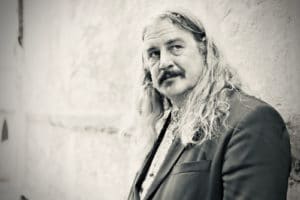
Allegorie op Europa
Grand Hotel Europa is naast een tragikomische liefdesgeschiedenis en een boek over onze oeverloze reislust – ‘Liefde in tijden van massatoerisme,’ grijnst Pfeijffer – vooral een allegorie op Europa. ‘De romanpersonages zitten ieder op hun eigen manier vast aan het verleden. Clio bijvoorbeeld komt uit een adellijke familie, ze heeft kunstgeschiedenis gestudeerd en heeft een oud palazzo waar ze voor moet zorgen – op allerlei manieren drukt het Europese verleden op haar schouders, deels ongewild, deels opgezocht. Ook de andere personages hebben last van of zitten vast aan het verleden. Dat is een metafoor voor Europa als geheel, want waar we echt heel veel van hebben in Europa, is het verleden. Zeker in een land als Italië.’
Het historische hart van Genua werd nog niet zo lang geleden door UNESCO uitgeroepen tot Werelderfgoed – maar is dat nou eigenlijk wel zo’n goede zaak? Want komen er dan niet juist nóg meer toeristen naar zo’n plek toe? ‘Tja,’ peinst Pfeijffer, ‘tegelijk is het wel een garantie dat projectontwikkelaars niet zomaar oude gebouwen kunnen afbreken om een groot betonnen hotel neer te zetten, dus dat werelderfgoed is misschien niet zo heel slecht. In het geval van Amsterdam is er misschien nog redding mogelijk omdat de stad een echte economie heeft, zij is niet totaal afhankelijk van toerisme. Voor een stad als Venetië geldt dat niet; daar wordt niks meer geproduceerd, er zijn geen kantoren. Het enige wat Venetië nog heeft als verdienmodel, is haar verleden. Ze kunnen alleen nog maar hun verleden verkopen. Dat oude erfgoed kunnen ze ten gelde maken.’
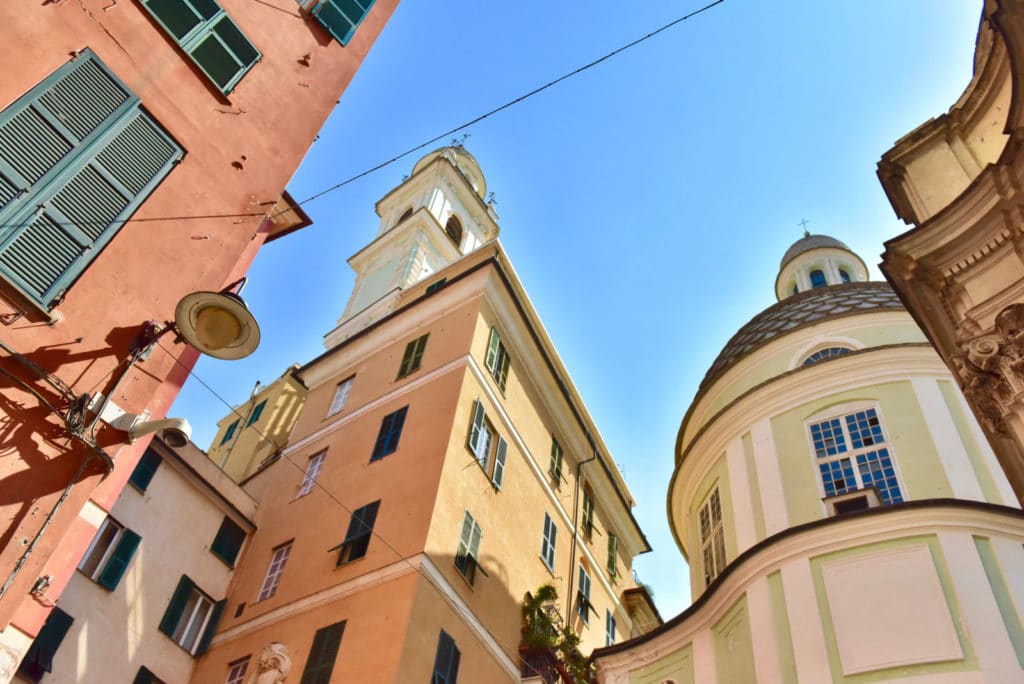
Europa als recreatiegebied
Wat voor die stad geldt, geldt eigenlijk voor het continent Europa als geheel, denkt de schrijver. ‘In vergelijking met de negentiende eeuw of het begin van de twintigste eeuw, heeft Europa enorm aan invloed verloren. Op mondiale schaal heeft Europa nauwelijks nog iets te zeggen, en ook economisch gezien. Europa produceert zelf steeds minder, er wordt steeds meer uitbesteed aan lagelonenlanden, China bijvoorbeeld. Tegelijkertijd is Europa heel populair bij toeristen, ook die uit de nieuwe booming landen, zoals China en India.’ Hij lacht. ‘Europa wordt min of meer het recreatiegebied voor de rest van de wereld.’
Pfeijffer wijst om zich heen – ook hier wonen steeds minder mensen achter de voordeuren van de palazzo’s. ‘De moeder van mijn vriendin woont bij de kathedraal, hier vlak om de hoek. In dat palazzo zijn ze nog met zijn tweeën over; van de tien appartementen worden er acht verhuurd als B&B. Dat geeft allerlei overlast; mensen raken de sleutels van de voordeur kwijt dus dat slot moet om de haverklap worden vervangen, er is veel troep in het trappenhuis, noem maar op. Maar wat er vooral verloren gaat, is een gemeenschap. Dat is lastig meetbaar, je kunt de gevolgen daarvan niet in cijfers vatten. Maar het is wel heel voelbaar.’
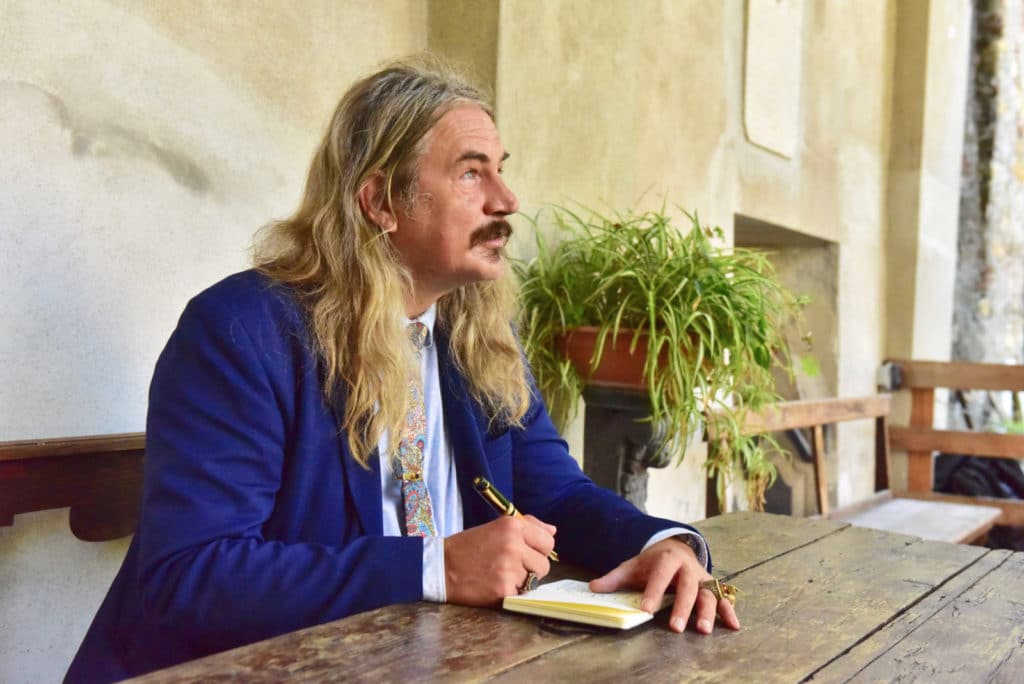
Monterosso
Met zijn roman wil hij die ontwikkeling schetsen en de vraag oproepen of die erg is. Gevraagd naar zijn eigen mening daarover, valt Pfeijffer voor het eerst even stil, peinzend over zijn antwoord. ‘Het is heel ambigu. Mijn boek is wel een beetje bedoeld als waarschuwing, maar ik wil vooral de lezer aan het denken zetten over dit soort problemen. Ik zoek de ambiguïteit op.’
‘Zo komt in de roman het voorbeeld voorbij van Monterosso, een van de vijf dorpjes van de Cinque Terre, een toeristische topbestemming. Monterosso is een klein, pittoresk vissersdorpje tussen de bergen, een soort miraculeus evenwicht tussen mens en natuur. Maar de twee vissers die tien jaar geleden nog over waren, konden de concurrentie met de grote vissersboten niet meer aan. Vanwege de ligging van het dorp kon ook de kleine haven niet worden uitgebreid. Dus feitelijk was Monterosso ten dode opgeschreven, want de enige bron van inkomsten was de visserij. Nu is het honderd procent toeristisch, maar gelukkig wel met goeie restaurantjes en barretjes, geen goedkope shit. Alle oorspronkelijke bewoners die er nog wonen verdienen nu hun geld met een bed en breakfast. Eigenlijk heeft het toerisme hier dus een dood dorp vermoord.’
Moderne migratie
Een oplossing voor de vragen die de roman opwerpt heeft ook hij niet voorhanden. ‘Mijn boek is een roman, geen essay waarin ik zeg hoe het moet. Massatoerisme is een heel recent fenomeen, dus het is niet zo vreemd dat we daar nog geen oplossing voor hebben bedacht. Toerisme is grootschalig geworden dankzij EasyJet, RyanAir en andere budgetvluchten. Het is nog maar vijftien jaar zo dat iedereen het zich kan permitteren om overal naartoe te gaan. Dus het is eigenlijk een heel nieuw probleem. Dat plaats ik tegenover de migratie van nu. Mensen gaan naar steeds verdere landen om de toeristen te mijden. Dus met al je geld gaan ze naar Afrika of Afghanistan, om daar te bekijken hoe erg het is in het land waar al die vluchtelingen vandaan komen die niet naar het westen mogen komen. Dat is heel raar.’
Lega Nord
Net als meer schrijvers, zoals bijvoorbeeld Philippe Claudel, maakt Pfeijffer zich zorgen over de toekomst van Europa. In een sterk verrechtsend Italië, waar het afgelopen jaar zelfs zwarte Italianen werden beschoten, voelt hij haast dagelijks de cohesie afbrokkelen. ‘De toekomst van Europa hangt in sterke mate af van de vraag of het continent in staat is een eensgezind antwoord te formuleren op de vluchtelingensituatie. En alles wijst erop dat dat niet lukt. We hebben hier een coalitie van twee populistische, xenofobe, anti-migratiepartijen. Vicepremier en Lega Nord-leider Salvini, eigenlijk een soort van schaduwpremier, is er heel goed in om elke dag de voorpagina van de kranten te halen. Als fel tegenstander van migratie bepaalt hij de agenda en legitimeert het anti-vreemdelingensentiment. Het land is er sterk verdeeld door, want Lega Nord is weliswaar de grootste partij, maar er zijn ook wel heel veel mensen die er niet op hebben gestemd. Die maken zich grote zorgen.’
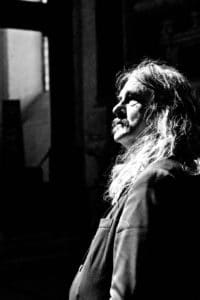
Gelukkig is Genua vriendelijker jegens mensen die het slecht hebben getroffen en hun heil elders proberen te zoeken. ‘Het is in de geschiedenis altijd een stad geweest van aankomst en vertrek. Ten tijde van de massa-emigratie van Italianen, aan het eind van de negentiende en het begin van de twintigste eeuw, vertrokken die miljoenen mensen naar Amerika uit Genua. Dus nu er veel Afrikanen naar Italië komen, beseffen veel inwoners: honderd jaar geleden waren wij die immigranten. Dat maakt Genua tamelijk tolerant. De stad ligt met haar gezicht naar de zee, naar Afrika. Daar heeft het historisch gezien meer banden mee dan met Milaan, ginds achter de bergen.’
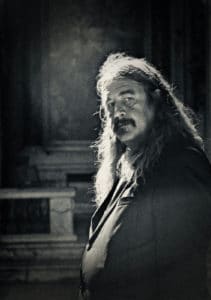
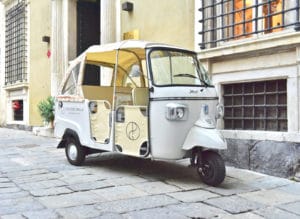



Als je alleen naar die eilanden in het moeras kijkt is de stad mogelijk ten dode opgeschreven maar Venetië is veel meer dan dat, net als Amsterdam. Industrie zul je niet zien in het historische centrum, wel eromheen. En met 50.000 inwoners is er echt voldoende draagvlak voor meerdere winkels in levensmiddelen. Daar zijn toeristen ook klant.
http://www.amcham.it/default.asp?id=765
Gelukkig mogen romans vrij omspringen met de feiten.
Dag Miro, sowieso fijn om, waar dan ook met jou in contact te zijn, je nuanceringen worden zoals altijd op prijs gesteld. En literaire vrijheid blijft natuurlijk ook een bijzonder ding 🙂 Toch, en deze voeg ik dan persoonlijk toe, is de tendens waar we veel mee te maken hebben in absolute cijfers (2/3 van de vaste bevolking teruggelopen in Venetië) dusdanig verontrustend dat ik me aansluit bij de vraag ‘Is dit eigenlijk wel een gunstige ontwikkeling’ die Ilja in zijn roman schetst. Als groot liefhebber van Italië en woonachtig in het hart ervan, kan ik in ieder geval stellen sinds een jaar of 10 beslist niet meer naar Venetië, Florence, Assisi of het nabij gelegen Orvieto te willen gaan in het hoogseizoen (Disney is daar een understatement)… De cijfers die getuigen van de terugloop in vaste inwoners zijn redelijk hard, maar die neem ik in deze uitwisseling maar even voor waar aan.Gelukkig mogen de mensen die feitelijk te maken hebben met de gevolgen van deze menselijke overspoeling, daar nog vrij in beslissen (althans in dit deel van de wereld vooralsnog) Groet, Marc
Comments are closed.